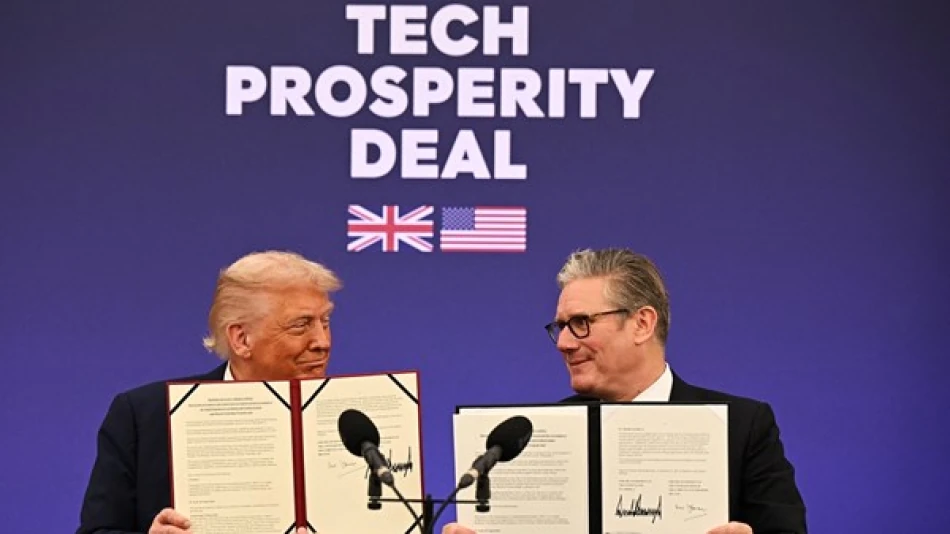
Trump and Starmer Ink Historic Tech Collaboration Agreement
Trump and Starmer Seal $205 Billion Tech Partnership, Reshaping US-UK Strategic Alliance
President Donald Trump and British Prime Minister Keir Starmer have signed a landmark technology cooperation agreement worth $205 billion, marking the largest bilateral investment commitment between the two nations in decades. The deal, focused on artificial intelligence and nuclear energy, signals a strategic pivot toward deeper tech integration as both countries race to maintain their competitive edge against China's technological advancement.
The Deal's Strategic Components
The agreement, signed during Trump's state visit to the UK at Chequers, encompasses a comprehensive $205 billion American investment package spanning technology, energy, and life sciences sectors. The partnership establishes formal cooperation frameworks between government agencies, universities, and private sector entities in both nations.
Trump emphasized that the deal will "enhance cooperation between public authorities, academic circles, and the private sector in areas such as artificial intelligence." This structure mirrors successful tech partnerships between the US and allies like Japan and South Korea, where government-backed research initiatives have accelerated innovation in semiconductors and advanced manufacturing.
Geopolitical Timing and Strategic Implications
Strengthening the "Special Relationship"
Starmer has actively courted closer US ties since Trump's inauguration in January, viewing technological cooperation as essential for Britain's post-Brexit economic strategy. This agreement represents the most substantial reinvestment in the US-UK "special relationship" since the Reagan-Thatcher era, when both nations coordinated closely on defense technology and nuclear cooperation.
The timing is particularly significant as both countries face mounting pressure from China's rapid advancement in AI, quantum computing, and clean energy technologies. By pooling resources and expertise, the US and UK aim to maintain their technological leadership while reducing dependence on Chinese supply chains.
Nuclear Energy Renaissance
The nuclear energy component addresses both nations' climate commitments and energy security concerns. Britain has struggled to finance new nuclear projects following Brexit, while the US seeks to revitalize its domestic nuclear industry. This partnership could accelerate deployment of small modular reactors (SMRs) and advanced nuclear technologies, positioning both countries as leaders in next-generation clean energy.
Market and Investment Implications
The $205 billion commitment represents approximately 8% of the UK's annual GDP, making it one of the largest foreign direct investment pledges in British history. For investors, this signals several key opportunities:
Technology sector growth: British AI startups and research institutions will gain access to American capital and expertise, potentially creating new unicorn companies and research breakthroughs.
Energy transformation: The nuclear cooperation could accelerate Britain's transition away from fossil fuels while creating new export opportunities for American nuclear technology companies.
Currency stability: The massive dollar inflow should strengthen the pound and provide economic stability during ongoing post-Brexit adjustments.
Competitive Response and Global Impact
This partnership likely pressures other Western allies to deepen their own technological cooperation agreements. The European Union, already concerned about being left behind in the AI race, may accelerate its own strategic partnerships with the US or increase investment in homegrown technology champions.
For global markets, the deal reinforces the trend toward "technological blocs" – allied nations pooling resources to compete against rival powers. This mirrors China's Belt and Road Initiative but focuses on high-tech sectors rather than infrastructure development.
The agreement's success will largely depend on execution and regulatory alignment between two different legal and business systems. However, the scale of commitment suggests both leaders view this partnership as essential for maintaining Western technological dominance in the coming decade.
Most Viewed News

 Layla Al Mansoori
Layla Al Mansoori






